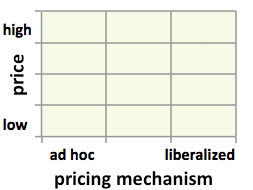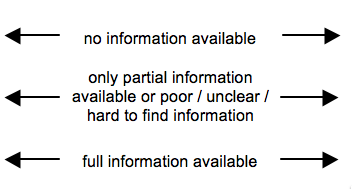Difference between revisions of "Fuel Prices Egypt"
***** (***** | *****) m (1 revision) |
***** (***** | *****) m |
||
| (6 intermediate revisions by 2 users not shown) | |||
| Line 1: | Line 1: | ||
| + | |||
{{Fuel Price Factsheet | {{Fuel Price Factsheet | ||
|Fuel Price Country=Egypt | |Fuel Price Country=Egypt | ||
| + | |Fuel Pricing Policies="Pricing policy: Fuel prices are uniform in the country, controlled by government, and frozen for years at a time. The official price of LPG has not changed since 1991, and is among the lowest in the world. In Nov 2012, government eliminated the subsidy for 95 RON gasoline and raised the price from LE 2.75 (US$0.45) to LE 5.85 (US$0.96). In Sep 2012, the new petroleum minister gave the details of the pricing structure to reduce the fuel subsidy burden, marking the first time the details were made public, although most of the proposals had been under discussion for several years. About 12 million households would be eligible to receive two 12.5-kg LPG cylinders a month at LE 5 (US$0.82). Households connected to the natural gas grid would not be eligible. LPG outside the quota would be available for LE 30 (US$5) a cylinder, still half the market price at the time of the announcement. A coupon system would be introduced for diesel, enabling certain users, including farmers and taxi-drivers, to purchase specified quantities at LE 1.10 (US$0.18)/ liter, while the remainder of consumers would be charged the full price of LE 4.85 (US$0.80)/liter. In Dec 2012, modified details about LPG subsidies were reported, raising the coupon price of LPG in 12.5-kg cylinders to LE 8 (US$0.11/kg). The price of fuel oil would be raised from LE 1,000 (US$164)/tonne to LE 2,300 (US$378)/ tonne except for food and a few other industries. In Jan 2013, Ministry of Trade and Industry announced that it would raise the price of fuel oil for the cement and ceramics industries from LE 1,000/tonne to LE 1,500 (US$246)/tonne. In Feb 2013, Minister of Petroleum and Mineral Resources said that rationing of subsidized fuel would be implemented using a system of smart cards between Apr and Jul 2013. In Mar 2013, government announced that it would begin experimental implementation of smart cards for the distribution of subsidized fuel for government vehicles starting from May 1 and for the public from July 1. Continuing diesel shortages for buses and trucks in Mar 2013 led the oil minister to dismiss top officials at two government-owned oil companies. | ||
| + | |||
| + | Protests: Protests, sit-ins, and strikes about LPG shortages have forced Egypt’s police and army to provide armed guards for gas deliveries. | ||
| + | |||
| + | Consequences of subsidies: Subsidies for liquid fuels and natural gas in fiscal 2007/08 (July–June) were estimated to amount to 7.1% of GDP, diesel accounting for half. The budget for fiscal 2012/13 cut fuel subsidy allocation to LE 70 billion (US$11.6 billion) from LE 95.5 billion (US$16 billion) in the 2011/12 budget. Fuels are diverted to black markets or smuggled out of the country." | ||
| + | |||
| + | (Source: Kojima, Masami. (2013, forthcoming). “Petroleum product pricing and complementary policies:Experience of 65 developing countries since 2009.” Washington DC: World Bank.) | ||
|Fuel Currency=EGP | |Fuel Currency=EGP | ||
|Fuel Price Exchange Rate=5.72 | |Fuel Price Exchange Rate=5.72 | ||
|Fuel Price Exchange Rate Date=2010/11/17 | |Fuel Price Exchange Rate Date=2010/11/17 | ||
| − | |||
| − | |||
|Fuel Price Composition Annotation=No information available. | |Fuel Price Composition Annotation=No information available. | ||
| − | |Fuel Pricing | + | |Fuel Matrix Pricing Mechanism=1 |
| − | |||
| − | |||
|Fuel Matrix Price Level=1 | |Fuel Matrix Price Level=1 | ||
| − | |||
|Fuel Matrix Annotation=Prices and price modifying decrees/laws of petroleum products to be found online on the webpage of the Ministry of Petroleum. | |Fuel Matrix Annotation=Prices and price modifying decrees/laws of petroleum products to be found online on the webpage of the Ministry of Petroleum. | ||
|Fuel Transparency Price Composition=1 | |Fuel Transparency Price Composition=1 | ||
|Fuel Transparency Pricing Mechanism=1 | |Fuel Transparency Pricing Mechanism=1 | ||
| − | }} | + | }} {{Fuel Price Factsheet Source |
| − | {{Fuel Price Factsheet Source | ||
|Fuel Price Factsheet Source Type=Pump prices and margins | |Fuel Price Factsheet Source Type=Pump prices and margins | ||
|Fuel Price Factsheet Source Link=http://www.petroleum.gov.eg/en/Pages/default.aspx | |Fuel Price Factsheet Source Link=http://www.petroleum.gov.eg/en/Pages/default.aspx | ||
| − | }} | + | }} {{Fuel Price Factsheet Source |
| − | {{Fuel Price Factsheet Source | ||
|Fuel Price Factsheet Source Type=Pump prices and margins | |Fuel Price Factsheet Source Type=Pump prices and margins | ||
|Fuel Price Factsheet Source Link=http://www.petroleum.gov.eg/ar/Laws/PricingLaws/Pages/default.aspx | |Fuel Price Factsheet Source Link=http://www.petroleum.gov.eg/ar/Laws/PricingLaws/Pages/default.aspx | ||
| − | }} | + | }} {{Fuel Price Factsheet Source |
| − | {{Fuel Price Factsheet Source | ||
|Fuel Price Factsheet Source Type=Pricing Mechanism | |Fuel Price Factsheet Source Type=Pricing Mechanism | ||
|Fuel Price Factsheet Source Link=http://www.petroleum.gov.eg/ar/Laws/PricingLaws/Pages/default.aspx | |Fuel Price Factsheet Source Link=http://www.petroleum.gov.eg/ar/Laws/PricingLaws/Pages/default.aspx | ||
}} | }} | ||
| + | |||
| + | [[Category:Egypt]] | ||
Latest revision as of 16:11, 15 July 2014
Part of: GIZ International Fuel Price database
Also see: Egypt Energy Situation
Fuel Pricing Policies
| Local Currency: | EGP |
| Exchange Rate: | 5.72
|
| Last Update: |
"Pricing policy: Fuel prices are uniform in the country, controlled by government, and frozen for years at a time. The official price of LPG has not changed since 1991, and is among the lowest in the world. In Nov 2012, government eliminated the subsidy for 95 RON gasoline and raised the price from LE 2.75 (US$0.45) to LE 5.85 (US$0.96). In Sep 2012, the new petroleum minister gave the details of the pricing structure to reduce the fuel subsidy burden, marking the first time the details were made public, although most of the proposals had been under discussion for several years. About 12 million households would be eligible to receive two 12.5-kg LPG cylinders a month at LE 5 (US$0.82). Households connected to the natural gas grid would not be eligible. LPG outside the quota would be available for LE 30 (US$5) a cylinder, still half the market price at the time of the announcement. A coupon system would be introduced for diesel, enabling certain users, including farmers and taxi-drivers, to purchase specified quantities at LE 1.10 (US$0.18)/ liter, while the remainder of consumers would be charged the full price of LE 4.85 (US$0.80)/liter. In Dec 2012, modified details about LPG subsidies were reported, raising the coupon price of LPG in 12.5-kg cylinders to LE 8 (US$0.11/kg). The price of fuel oil would be raised from LE 1,000 (US$164)/tonne to LE 2,300 (US$378)/ tonne except for food and a few other industries. In Jan 2013, Ministry of Trade and Industry announced that it would raise the price of fuel oil for the cement and ceramics industries from LE 1,000/tonne to LE 1,500 (US$246)/tonne. In Feb 2013, Minister of Petroleum and Mineral Resources said that rationing of subsidized fuel would be implemented using a system of smart cards between Apr and Jul 2013. In Mar 2013, government announced that it would begin experimental implementation of smart cards for the distribution of subsidized fuel for government vehicles starting from May 1 and for the public from July 1. Continuing diesel shortages for buses and trucks in Mar 2013 led the oil minister to dismiss top officials at two government-owned oil companies.
Protests: Protests, sit-ins, and strikes about LPG shortages have forced Egypt’s police and army to provide armed guards for gas deliveries.
Consequences of subsidies: Subsidies for liquid fuels and natural gas in fiscal 2007/08 (July–June) were estimated to amount to 7.1% of GDP, diesel accounting for half. The budget for fiscal 2012/13 cut fuel subsidy allocation to LE 70 billion (US$11.6 billion) from LE 95.5 billion (US$16 billion) in the 2011/12 budget. Fuels are diverted to black markets or smuggled out of the country."
(Source: Kojima, Masami. (2013, forthcoming). “Petroleum product pricing and complementary policies:Experience of 65 developing countries since 2009.” Washington DC: World Bank.)
Fuel Prices and Trends
| Gasoline 95 Octane | Diesel | |
|---|---|---|
| in USD* |
|
|
| in Local Currency |
|
|
* benchmark lines: green=US price; grey=price in Spain; red=price of Crude Oil
Fuel Price Composition
Price composition.
No information available.
At a Glance
| Regulation-Price-Matrix |
| ||||
 |

|

|

| ||
Prices and price modifying decrees/laws of petroleum products to be found online on the webpage of the Ministry of Petroleum.
Sources to the Public
| Type of Information | Web-Link / Source |
|---|---|
| Pricing Mechanism | http://www.petroleum.gov.eg/ar/Laws/PricingLaws/Pages/default.aspx |
| Pump prices and margins | http://www.petroleum.gov.eg/en/Pages/default.aspx |
| Pump prices and margins | http://www.petroleum.gov.eg/ar/Laws/PricingLaws/Pages/default.aspx |
Contact
Please find more information on GIZ International Fuel Price Database and http://www.giz.de/fuelprices
The following coordinate was not recognized: {{#geocode: Egypt|google }}.



















